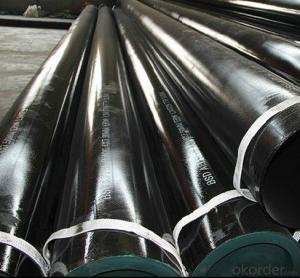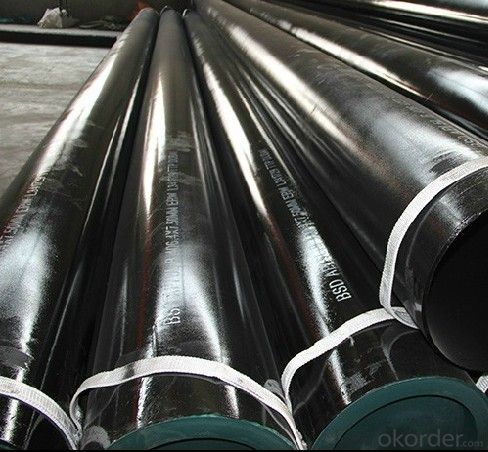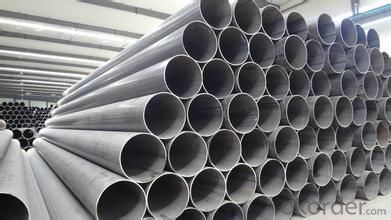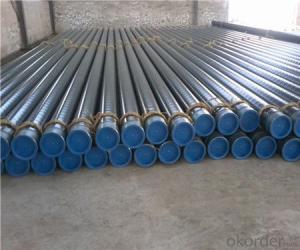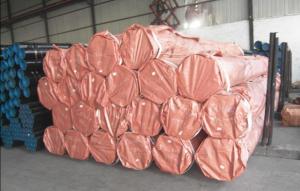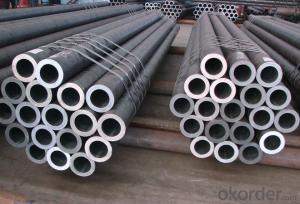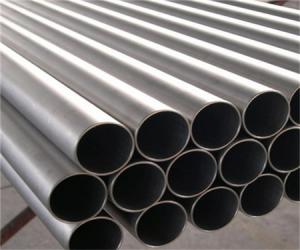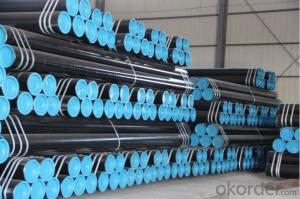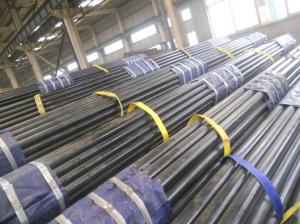ASTM A53 API 5L Straight Seam Steel Pipe
- Loading Port:
- China Main Port
- Payment Terms:
- TT or LC
- Min Order Qty:
- -
- Supply Capability:
- -
OKorder Service Pledge
OKorder Financial Service
You Might Also Like
Quick Details
| Thickness: | 1 - 73 mm | Section Shape: | Round | Outer Diameter: | 6 - 830 mm |
| Place of Origin: | China (Mainland) | Secondary Or Not: | Non-secondary | Application: | Fluid Pipe,chemical,construction,structure,fluid,bioler,drill,hydraulic,gas,oil, |
| Technique: | Cold Rolled | Certification: | CE | Surface Treatment: | Galvanized |
| Special Pipe: | Thick Wall Pipe | Alloy Or Not: | Non-alloy | color: | carbon black |
| packing: | in bundles | lenght: | 6m--12m | ends: | plain or bevel |
| surface: | oiled or black | Coating: | 3PE,FBE or as per your request. | head code: | round |
| Material: | CS/SS/AS | Grade: | 20#,16Mn,API J55,10#-45#,API J55-API P110 | Standard: | ASTM A106-2006,ASTM A53M-2007,API 5L,ASTM,API |
Packaging & Delivery
| Packaging Detail: | 6 steel strip,bundles,Caps , plastic wrap,loading belt or according to your request. |
| Delivery Detail: | Within 30 days after confirmed the order |
Specifications
1.API 5L/ASTM A53 ERW/straight seam steel pipe.
2.standard:ASTM,ANSI,JIS,EN,BS,GOST.
3.API&ISO9001 certification.
API 5L/ASTM A53 ERW/Straight Seam Steel Pipe Image
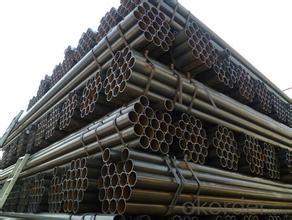
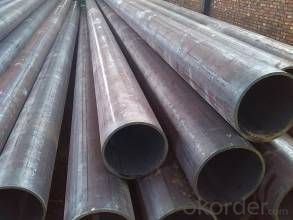
FAQ of Seamless Pipe
①How is the quality of your products?
Our products are manufactured strictly according to national and internaional standard, and we take a test
on every pipe before delivered out. If you want see our quality certifications and all kinds of testing report, please just ask us for it.
Guaranteed: If products’ quality don’t accord to discription as we give or the promise before you place order, we promise 100% refund.
②How about price?
Yes, we are factory and be able to give you lowest price below market one, and we have a policy that “ for saving time and absolutely honest business attitude, we quote as lowest as possible for any customer, and discount can be given according to quantity”,if you like bargain and factory price is not low enough as you think, just don’t waste your time.Please trust the quotation we would give you, it is professional one.
③Why should you chose us?
Chose happens because of quality, then price, We can give you both.Additionally, we can also offer professional products inquiry, products knowledge train(for agents), smooth goods delivery, exellent customer solution proposals.Our service formula: good quality+good price+good service=customer’s trust
SGS test is available, customer inspection before shipping is welcome, third party inspection is no problem.
Any question, pls feel free to contact us !
- Q: Does seamless steel tube have a bend of 135 degrees?
- In engineering, it is usually marked as "45 elbow" and has no "135" mark. The angle of the elbow is acute, so there will be no more than 90 degrees elbow.
- Q: Can steel pipes be used for underground telecommunications networks?
- Yes, steel pipes can be used for underground telecommunications networks. Steel pipes are commonly used in underground applications due to their strength, durability, and resistance to corrosion. They provide protection and support for the telecommunication cables and can withstand the external pressure and load that occur underground. Additionally, steel pipes can be coated with protective materials to further enhance their resistance to corrosion and extend their lifespan. Overall, steel pipes are a reliable choice for underground telecommunications networks.
- Q: What are the common applications of steel pipes in construction?
- Steel pipes are commonly used in construction for various applications such as structural support, plumbing, water distribution, gas transportation, and HVAC systems. They provide strength, durability, and resistance to corrosion, making them an ideal choice for these purposes.
- Q: What is the difference between steel pipes and PEX pipes?
- The main difference between steel pipes and PEX pipes lies in their material composition. Steel pipes are made of rigid metal and are typically used for industrial applications, while PEX pipes are made of flexible plastic and are commonly used for residential plumbing systems. Steel pipes offer durability and strength, but can be prone to corrosion. PEX pipes, on the other hand, are corrosion-resistant and easier to install due to their flexibility. Additionally, PEX pipes have better insulation properties and are less likely to burst in freezing temperatures compared to steel pipes.
- Q: How are steel pipes used in industrial manufacturing processes?
- Steel pipes are commonly used in industrial manufacturing processes for various purposes such as transporting fluids, gases, and solids, as well as providing structural support. They are used in industries like oil and gas, construction, automotive, and chemical manufacturing. Steel pipes offer high durability, strength, and resistance to corrosion, making them ideal for handling harsh environments and high-pressure applications. Additionally, they can be easily welded, bent, and manipulated to fit specific requirements, allowing for efficient and cost-effective installations.
- Q: Heating system DN40 and DN32 welded steel pipe how to connect?
- Welding: AC arc welding machine welding. Mode 1: apply to the medium of non demanding piping, DN40 steel pipe necking and DN32 steel pipe butt welding, or directly DN32 steel pipe into the DN40 internal welding. 2: the pipeline requirements apply to the inner wall of smooth transition, reducing short circuit welding for DN40x32 suppression of this mechanism are used for connection pipe seamless steel pipe high pressure pipeline connection, no special requirements, not commonly used welded steel pipe. Connection of mechanism fittings is not only costly, but not necessary unless special requirements are required!
- Q: What is the role of steel pipes in sewage systems?
- The role of steel pipes in sewage systems is to provide a durable and reliable means of transporting wastewater and sewage from homes, businesses, and other sources to treatment plants or disposal sites. Steel pipes are known for their strength, corrosion resistance, and longevity, making them suitable for withstanding the harsh and corrosive nature of sewage. They are capable of handling high-pressure flows and can withstand the weight and pressure of the surrounding soil. Additionally, steel pipes are often used in larger diameter applications due to their ability to carry larger volumes of sewage efficiently.
- Q: What are the different types of steel pipe fittings for plumbing systems?
- There are several types of steel pipe fittings commonly used in plumbing systems, including elbows, tees, couplings, unions, caps, and plugs. Each of these fittings serves a specific purpose in connecting and directing the flow of water or other fluids within the plumbing system.
- Q: What are the factors affecting the durability of steel pipes?
- There are several factors that can affect the durability of steel pipes. These include corrosion, temperature fluctuations, mechanical stress, and exposure to chemicals or abrasive materials. Additionally, the quality of the steel used in the pipes, the design and construction of the piping system, and proper maintenance and inspection practices can also impact their durability.
- Q: Are steel pipes suitable for use in food processing industries?
- Yes, steel pipes are suitable for use in food processing industries. Steel pipes are highly durable, resistant to corrosion, and can withstand high temperatures and pressures, making them ideal for transporting various food products and fluids. Additionally, steel pipes are easy to clean, maintain hygiene standards, and comply with food safety regulations, making them a reliable choice for the food processing industry.
Send your message to us
ASTM A53 API 5L Straight Seam Steel Pipe
- Loading Port:
- China Main Port
- Payment Terms:
- TT or LC
- Min Order Qty:
- -
- Supply Capability:
- -
OKorder Service Pledge
OKorder Financial Service
Similar products
Hot products
Hot Searches
Related keywords
